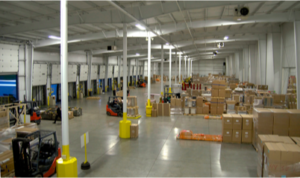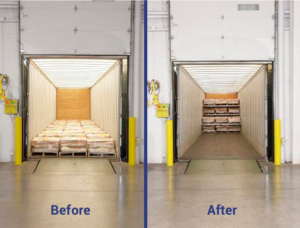Nice Try on Driver Shortages, But You Were Way Short of the Whole Story

Shame on All of Us for Our Thoughtless, Inefficient Shipping Habits, Load After Load, Year After Year
Many thanks, Crain’s Guest Blogger Lisa Katz, for your thoughtful take on the very real challenges of making a top-dollar living as a driver. Earning those higher annual incomes in the business often means a serious commitment to time on the road. It’s no easy life, that’s for sure.
No thanks, however, Ms. Katz, for ignoring the elephant in the room when it comes to driver shortages. Even when drivers’ annual compensation ranges from good to great, the North American trucking industry will continue to experience shortages.
We … the industry owners and managers, and the thousands of businesses we serve … are shooting ourselves in the foot – and here is why:
Lazy, inefficient, environmentally shameful practices in the supply chain waste millions of driver miles on underloaded, poorly loaded, sometimes virtually empty trailers throughout North America. We’ve done it every day, year after year, for decades … and very few of us are will to stand up and talk about this.
Our inefficiencies abound. If everyone gives lip service these days by saying they want to be “green” and “socially responsible,” then why is this still happening? Why does the supply-chain industry keep hiding epic-proportion inefficiencies behind our locked trailer doors?
Because we can.
Because it’s more cash in our pockets to “ship air” in under-optimized loads over our roads.
You see, shipping departments are not a huge part of a firm’s overall bottom line, so paying $8,000 or so to move a pricy robot or machine to market in a nearly empty trailer is no big deal when the robot is worth a half-million bucks or more. And the driver’s bosses who are taking the $8,000 for that nearly empty trailer? They don’t care; they’ll ship air. Anywhere. They’ll take the money for that inefficient behavior – over and over and over.
But guess what?
Now we have a driver crisis of national proportions. And the drivers know very well about this dirty little secret that’s wasting their hard-driving hours on the job. Many of them are truly disgusted at us – the company owners (me), the managers, the shipping departments – because they know we’re all in environmentally unsustainable territory.
These practices have got to end.
At a recent social event among a crowd of people whose lives and careers depend on all things trucking, a conversation turned to Detroit-area auto companies and their high-profile, public “commitment” to efficiency and serving the consumer. Unfortunately, the conversation was truly disheartening.
Story after story involved car companies and suppliers moving nearly empty, full-size trucks far and wide with only one high-tech dashboard inside, or one crate with a robotic replacement arm, or even one little box of parts that the driver kept in his cab with him! But he still had to haul the whole empty trailer! The driver even offered to drop off his trailer to save fuel … but was ordered to keep rolling.
And you wonder why even a smaller new car these days costs 25 to 30 grand??
I’ve been in this business now for a half-century. We have some long-term, systemic problems that continue to tarnish our reputation. Unfortunately, we deserve every one of those problems.

*Driver shortage?
There wouldn’t be one if our all of our over-the-road units were properly optimized every day, in every way. There would be an adequate number of talented drivers to handle the optimized volume.
*Lousy road surfaces, especially in the freeze-thaw north?
Our highways would last longer if we didn’t waste millions of driver miles nationwide, pounding the pavement into potholes.
*Industry consumption of tires, drive trains, and related equipment?
Everything will last proportionately longer if load efficiency is increased.
*Our continued reputation problems with the general public?
Think how much better we would look if we actually were “green” and practiced what we preached.
-Response to August 2016 Crain’s Detroit Blog on: ‘Truck Driver Shortage Could Threaten Supply Chains’
From: Mike Dargis, Zip Xpress Inc President / Green Transportation Inc. Owner


